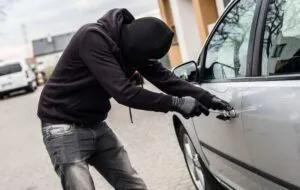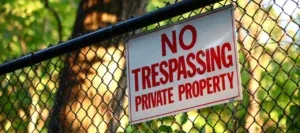California Property Crimes Attorney
Choose an Experienced Lawyer Specializing in Property Crimes to Help You Reduce the Impact of Your Arrest
Depending on the circumstances, property crimes may be infractions, misdemeanors, or serious felonies.
The criminal defense attorneys at My Rights Law are experienced in representing people accused of property crimes. We aim to get your case resolved on the most favorable grounds possible. Contact an experienced criminal defense lawyer at My Rights Law at (888) 702-8845 or through our secure web form for a free consultation.
- 1. Trespassing – Penal Code 602 PC
- 2. Aggravated Trespass – Penal Code 601 PC
- 3. What Are Defenses To Trespass Charges?
- 4. Peeking While Loitering – Penal Code 647(i) PC
- 5. Vandalism – Penal Code 594
- 6. How Serious Is Vandalism?
- 7. Graffiti On Private Property – Penal Code 640.6
- 8. Graffiti On Government, Public Transportation System, Or DOT Property – Penal Code 640.5
- 9. Graffiti Or Vandalism Near A Highway – Penal Code 640.7
- 10. Vandalizing A Freeway – Penal Code 640.8
- 11. What Are Defenses To Vandalism Charges?
- 12. California Property Crimes Lawyer
Trespassing – Penal Code 602 PC
California Penal Code 602 outlaws trespassing. Trespassing is entering another’s property without permission. Generally, the first trespassing offense is an infraction, which carries a fine. The second trespassing offense under Section 602 of the California Penal Code is a misdemeanor, which carries a penalty of six months jail time and a $1,000 fine[1]. Types of trespassing include:
- Entering or driving on another person’s property without the owner’s permission
- Taking or cutting down timber from another person’s property
- Taking soil from another person’s property
- Tearing down or destroying a sign on private property
- Taking oysters or shellfish from another’s property
- Entering a farm without permission or injuring or taking farm animals
- Tearing down another person’s fence
- Living in a structure or residing on land without the owner’s consent
- Refusing to leave a property after the owner’s request or a police officer’s request
- Entering closed property
- Skiing on a closed ski trail
- Refusing to leave a hotel or motel.
Aggravated Trespass – Penal Code 601 PC
Per California Penal Code Section 601, aggravated trespass is entering a person’s property or place of work without permission after threatening to hurt someone[2]. The threat must have occurred within the past thirty days. Aggravated trespass is a wobbler offense, meaning that the prosecutor has the discretion to charge the defendant with a misdemeanor, a less severe crime, or a felony, a more severe crime. Misdemeanor aggravated trespass has a penalty of six months in jail and a $1,000 fine. In contrast, felony aggravated trespass has a consequence of up to three years in county jail and felony probation. Conviction of a felony may impact a person’s immigration status and ability to own firearms legally.
What Are Defenses To Trespass Charges?
A skilled criminal defense attorney can advocate for you if you have been charged with trespass. An attorney may assert various defenses, depending on the circumstances of your case. Types of defenses an attorney may use include:
- The property owner allowed you to be on the property
- You did not actually go on the property and did not deprive the owner of the use and enjoyment of the property.
- You did not intend to interfere with the owner’s property and lacked the required mental state for the crime.
- You had a legal right to be on the premises to participate in an organized activity.
Peeking While Loitering – Penal Code 647(i) PC
California Penal Code 647(i) Peeking While Loitering is known colloquially as California’s “peeping Tom” law. Penal Code 647(i) prohibits entering a person’s property, loitering, and peering through a person’s window without a valid or lawful reason to be there, and peeking while loitering is a misdemeanor in California[3]. It carries a punishment of six months in jail and a $1,000 fine.
Vandalism – Penal Code 594
Per California Penal Code 594, destroying, damaging, or defacing another person’s property on purpose constitutes vandalism. Vandalism includes using graffiti to deface property[4]. Vandalism often suggests teenagers with spray paint, but many types of intentional and malicious property damage can constitute vandalism[5]. For instance, keying a car or purposefully breaking someone’s possessions may constitute vandalism.
How Serious Is Vandalism?
With vandalism charges, the seriousness of the offense turns on the amount of damage done, and fines can be hefty. Indeed, if the damage was less than $400, then vandalism is a misdemeanor punishable by one year in jail and a $1,000 fine. If the damage is greater than $400, vandalism is a wobbler offense, which the prosecution can charge as a misdemeanor or felony. The penalty for it is up to one to three years in jail and a $10,000 fine. If the damage is $10,000 or more, the person responsible for the damage may owe a $50,000 fine. In addition, the person who did the vandalism may be required to clean it up.
Graffiti On Private Property – Penal Code 640.6
Per California Penal Code 640.6, defacing another person’s or entity’s property with graffiti where the damage is less than $250 is an infraction[6]. The penalty is a fine of up to $1,000 and between 48 and 200 hours of community service over 180 days. Instead of community service, the judge may order the defendant to keep an area free of graffiti for 90 days. Multiple prior convictions of vandalism-related offenses increase the severity of the crime, and a defendant could face three years in jail, a $3,000 fine, and 600 hours of community service.
Graffiti On Government, Public Transportation System, Or DOT Property – Penal Code 640.5
A person who does graffiti on any of the following is guilty of a misdemeanor:
- The inside or outside of government facilities or vehicles
- Public transportation system facilities or vehicles
- Department of Transportation subsidized facilities of or vehicles
- Leased or rented facilities or vehicles of the government, public transportation system, or Department of Transportation where the damage and clean-up costs are less than $250[7].
As with Penal Code 640.6, the punishment is up to a $1,000 fine and between 48 and 200 hours of community service over 180 days. Instead of ordering community service, the judge may order a person to keep an area clean of graffiti for 180 days. The offense is an infraction, but a prior history of vandalism-related offenses can raise the crime to a misdemeanor. The judge may also order the defendant to clean up the graffiti, as with charges of vandalism. Indeed, California Penal Code Sections 594 and 640.5 overlap, and a person can be convicted of both vandalism under Section 594 and graffiti.
Graffiti Or Vandalism Near A Highway – Penal Code 640.7
Per California Penal Code 640.7, defacing property with graffiti or vandalism within 100 feet of a highway is a misdemeanor, with a punishment of six months in jail and a $1,000 fine[8]. Types of property that a defendant might have defaced near the highway include guardrails, signs, traffic signals, and snow poles.
Vandalizing A Freeway – Penal Code 640.8
Vandalizing property or graffiti on a freeway is a more severe misdemeanor than vandalizing property near a highway[9]. Vandalizing a freeway includes defacing sound walls, guardrails, overpasses, signals, signs, and other devices relating to traffic control. Under California Penal Code 640, vandalizing property on a freeway carries a punishment of up to one year of jail time and up to a $5,000 fine. Further, the court could order up to 480 hours of community service in 420 days as a condition of probation.
What Are Defenses To Vandalism Charges?
With the help of knowledgeable property crimes lawyers, such as those from My Rights Law, you may challenge vandalism charges on several grounds. First, your criminal defense lawyer may assert mistaken identity. Specifically, your lawyer may argue that the police apprehended the wrong person for the crime. Vandalism often occurs at night, and vandals may be difficult to identify. Second, your criminal defense lawyer may state that any damage you made was unintentional. A vandalism conviction requires the defendant to have meant to commit vandalism. Your attorney could argue that you defaced property by accident and, therefore, you are not guilty of vandalism.
California Property Crimes Lawyer
The criminal defense attorney you choose can make the difference between having criminal charges dismissed or being severely punished. My Rights Law’s strong team of criminal lawyers have the resources and experience that enable us to pursue difficult cases yielding favorable results. We protect our clients through our expertise in the law and extensive experience in handling all misdemeanor and felony criminal cases including, but not limited to, alcohol-related crimes, drug crimes, violent crimes, domestic violence, sex crimes, crimes against children, theft crimes, juvenile delinquency crimes, gun crimes, property crimes, cybercrimes, driving offenses, public safety crimes, federal crimes, financial crimes, crimes against the government, crimes against justice, and inchoate crimes. We also specialize in restraining orders, pretrial diversion programs, and expungements.
Although property crimes are not violent, property crime convictions carry significant penalties, including jail time, sizeable fines, and a criminal record. If you are facing a property crime charge, you may wish to have an experienced criminal defense attorney on your side. The defense lawyers at My Rights Law have substantial experience defending people accused of property crimes and understand the complexities of property crime law. Call us now at (888) 702-8845 or contact us through our secure web form for a free consultation with an attorney that can help you.
FOOTNOTES
[1] California Penal Code 602
[2] California Penal Code Section 601
[3] California Penal Code 647(i)
[4] California Penal Code 594
[5] Judicial Council of California Criminal Jury Instructions (CALCRIM) 2022
[6] California Penal Code 640.6
[7] California Penal Code 640.5
[8] California Penal Code 640.7
[9] California Penal Code 640.8

















